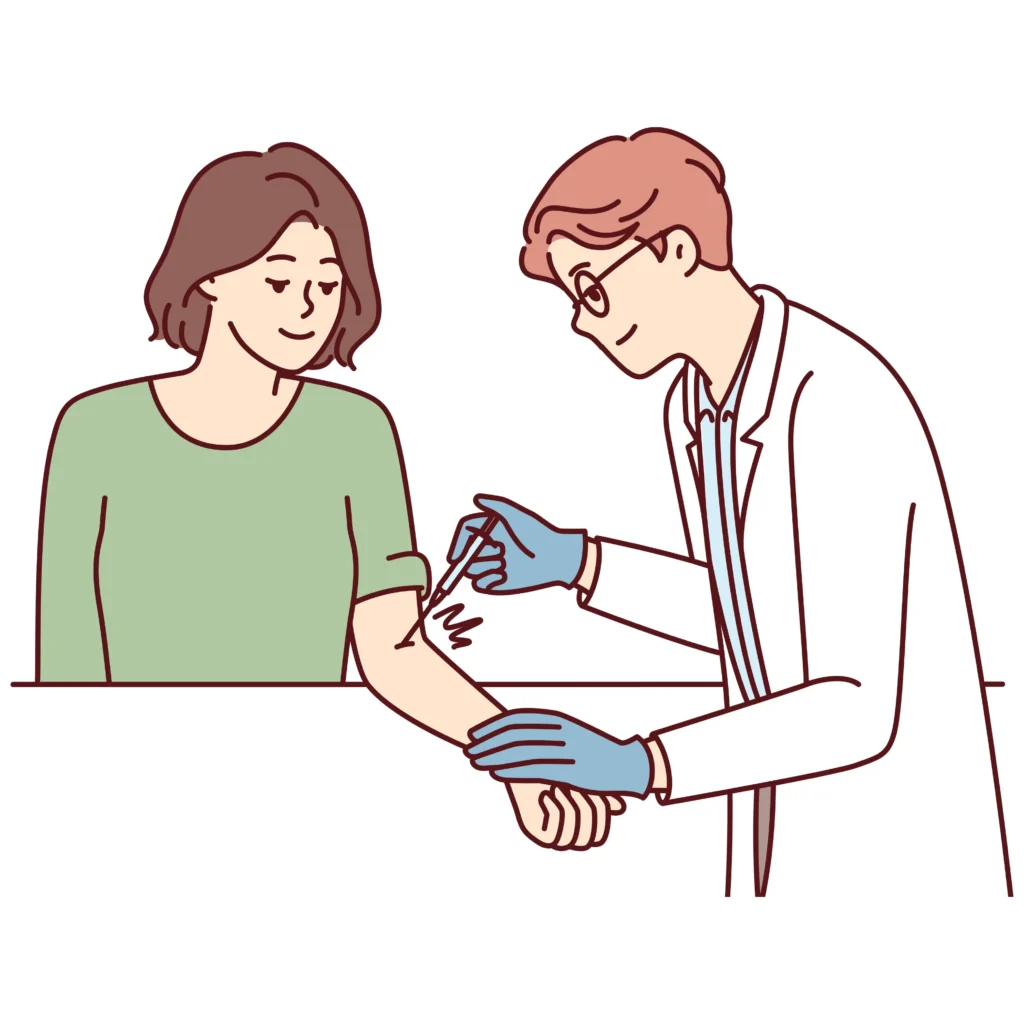Immunisation
Immunisation in Patna, Bihar
At Aaranyam Women’s Hospital, we believe in the power of prevention through immunisation. Immunisation is like a superhero shield, protecting you and your loved ones from harmful diseases. We’re here to make sure you and your community stay strong and healthy. Dr. Monalisa singh, encourages everyone to embrace the superhero power of vaccines. Trust Aaranyam Women’s Hospital for your immunization needs – because a healthy tomorrow begins with a protected today.
The Importance of Immunisation
Immunisation, or vaccination, is like giving your body a superhero shield. We use a small, weak part of a germ (vaccine) to train your body’s defense system. This helps your body learn how to fight off specific diseases, keeping you and others safe. So, it’s not just about protecting yourself; it’s like building a protective wall for everyone in your community. It makes it harder for sickness to spread around. So, when you get vaccinated, you’re not only looking out for yourself but also being a hero for everyone around you. Immunisation vaccine for pregnant women is very important.

Benefits of Immunization:
1. Disease Prevention
Immunisation is a powerful tool in preventing a wide range of infectious diseases, including measles, mumps, rubella, polio, influenza, and more.
2. Reducing Disease Spread
By building immunity within the population, immunization helps curb the spread of diseases, protecting those who cannot receive vaccines, such as individuals with certain medical conditions or allergies.
3. Protecting Vulnerable Populations
Immunisation is particularly essential for vulnerable populations, such as infants, elderly individuals, and those with weakened immune systems, who are more susceptible to severe complications from preventable diseases.
4. Preventing Outbreaks
High vaccination rates contribute to community immunity, making it difficult for diseases to spread and preventing outbreaks.
How Does the Immune System Work?
The immune system is a complex network of cells, tissues, and organs that work together to defend the body against harmful pathogens, such as bacteria, viruses, fungi, and parasites. At the same time, it’s smart enough to tell the difference between these invaders and our own cells, so it doesn’t accidentally attack them.
Understanding how the immune system works and the types of immunity it provides is important for knowing the importance of immunization, particularly in settings such as an immunisation clinic in Patna, Bihar, where access to vaccination services is critical for public health, including pregnancy vaccination. Visit AHL for the best immunisation and gynaecologist treatment in Patna.
The immune system can be broadly categorized into two main branches: the innate immune system and the adaptive immune system.
1.Innate Immune System:
The innate immune system serves as the body’s first line of defense against germs or bacteria. It includes physical barriers, such as the skin and mucous membranes, which prevent bacteria from entering the body. Special cells in our body, like macrophages, neutrophils, and natural killer cells, can spot and destroy germs without needing to know exactly what they are.
These cells detect molecular patterns shared by broad classes of pathogens, known as pathogen-associated molecular patterns (PAMPs), triggering rapid responses to contain and eliminate the threat.
2.Adaptive Immune System:
The adaptive immune system provides a more specific and targeted response to pathogens, tailored to the particular characteristics of each invader. It involves specialized cells, including T cells and B cells, that work together to mount a highly coordinated immune response.
T Cells: T cells are responsible for cell-mediated immunity, which involves the direct targeting and destruction of infected or abnormal cells. They recognize antigens presented by antigen-presenting cells (APCs) and coordinate immune responses by activating other immune cells or directly killing infected cells. Subsets of T cells, such as helper T cells and cytotoxic T cells, play distinct roles in orchestrating immune responses.
B Cells: B cells are responsible for humoral immunity, which involves the production of antibodies that target specific pathogens. When activated by antigens, B cells differentiate into plasma cells, which secrete antibodies capable of binding to and neutralizing pathogens. Memory B cells are also generated during an immune response, providing long-term immunity by facilitating rapid antibody production upon re-exposure to the same pathogen.
Types of Immunity:
Active Immunity:
Active immunity occurs when the immune system mounts a response to a pathogen or vaccine antigen, resulting in the production of memory cells that confer long-lasting protection against subsequent exposures. Immunization services, such as those provided by an immunization clinic in Patna, stimulate active immunity by administering vaccines containing weakened or inactivated pathogens or their antigens.
This includes pregnancy vaccination, where vaccines for pregnant women are specifically designed to confer protection to both the mother and the developing fetus against certain diseases, such as influenza and tetanus.

Passive Immunity:
Passive immunity involves the transfer of preformed antibodies or immune cells from one individual to another, providing immediate but temporary protection. This can occur naturally, such as through the transfer of maternal antibodies across the placenta to the fetus during pregnancy, or artificially, through the administration of immune serum or immunoglobulin preparations.
While passive immunity does not confer long-term protection, it can be invaluable in providing immediate protection against certain diseases in situations where active immunity has not yet developed.
Our Commitment to Immunization
At Aaranyam Women’s Hospital, we are committed to promoting the importance of immunization as a fundamental aspect of preventive healthcare. Our team, guided by a dedication to community well-being, encourages individuals to stay up-to-date with recommended vaccinations for a healthier and safer tomorrow.
Immunization is a cornerstone of public health, offering protection against a range of infectious diseases. Aaranyam Women’s Hospital advocates for immunization as a vital tool for individual and community well-being. If you have questions or concerns about vaccines, our healthcare professionals are here to provide information and guidance, ensuring you make informed decisions about your health and the health of those around you.
